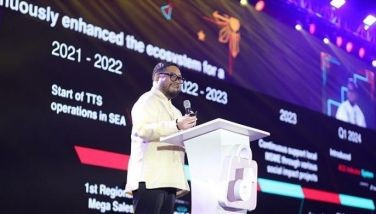How do you know if this is it?
The Romans believed in carpe diem. Horace used the term as part of a phrase that said, “Seize the day, trusting as little as possible in the future.”
The Romans’ problem with leaving things to chance is a paranoia shared by many successful entrepreneurs such as Andy Grove, founder of Intel. He once said, “When it comes to business, I believe in the value of paranoia. Business success contains the seeds of its own destruction.”
As I attended business forums in different countries, I noticed that many first-time entrepreneurs ponder the consequences of opportunity. It’s a global paranoia. It is not uncommon that newly minted entrepreneurs find themselves becoming serial entrepreneurs. They become addicted to opportunity, in love with the chase but forgetting about the destination. Like an Easter egg hunt on too many Red Bulls, they grab every egg they see and realize that there’s no basket to hold them in. This excitement turns into madness pretty quickly.
So while entrepreneurs must learn to master the art of clairvoyance with the proverbial crystal ball (also known as the newspaper, the ultimate treasure chest of ideas, it is only the seasoned entrepreneur that masters sniffing out the right opportunities and leaving the duds to the vultures. The trick is to continue cultivating that enterprise with the same paranoid zealousness as that of Intel. Look where that got them. Lust, caution.
Here are some ideas:
1. An opportunity is not an island. Many new entrepreneurs decide to start a new business in a vacuum. They don’t bother understanding the broad economic environment, political and regulatory headwinds, not to mention industry trends that can normally lead to compromises or complications after capital has been committed and your enterprise is well on its way ... hopefully. While entrepreneurs should rarely be dissuaded from poor macro-economic indicators, it is always wise to know where the wind is blowing so you can chart your journey and do your resource planning properly.
Most businesses close shop in the first year due to lack of capital. If macro-environment is poor, an entrepreneur must forecast his cash flows well and not rely on unsecured sources of funding to bridge money-losing operations.
Case in point: Many a sugar trader went out of business in the Philippines after the 1974 quota law expired between the US and the Philippines, ending the economic subsidy between the two countries. Sh*t rolls downhill. It is critical that entrepreneurs understand decisions being made by the powers-that-be upstream, because eventually it will affect everyone downstream.
2. Make sure your opportunity is anchored on fulfilling a sustainable human want or need. Changes in the political, economic, social and legal landscape affect human conditions. Any changes in human conditions affects people’s lifestyles, desires, wants and needs. One of the most important tenets of opportunity screening is to ensure that one’s opportunity or big idea is based on fulfilling a sustainable want or need. Remember Pets.com? It raised US$300 million but blew it all on catering to an unsustainable need. Pets.com sold supplies to pet lovers at 1/3 of its cost in order to attract customers. The Internet didn’t revolutionize the convenience of buying pet food, as buying it in the real world was fairly straightforward (ergo, buying a stick of gum). Thus, Pets.com slashed prices in order to attract customers, forgetting that the primary purpose of a business is to make money. Eventually it closed down due to an unsustainable and unfeasible model. Pets.com is officially in the doghouse.
On the other hand, you have a company such as Amazon.com with over $10 billion in sales per year. The company has branched out into more than just books. Amazon is now a lifestyle brand, selling everything from clothes to ovens. Amazon’s strength is not only found with the ease and convenience of online shopping coupled with a world-class logistics infrastructure, which enables it to deliver products to customers in a timely manner and at a reasonable cost.
Its secret is that it sells things you need, and it sells products such as books, which normally take a long time for people to find in a traditional bricks-and-mortar store. By shopping on Amazon one can find their desired product (book, CD) much quicker and more conveniently.
These things you need to live can be bought with a click of a button. Amazon’s economies of scale allow it to purchase products at wholesale prices, ensuring the company a healthy profit margin. Everybody wins. When it comes to books and music, Amazon.com helps people find what they are looking for. This is clearly a sustainable need.
3. You must assess external and internal factors. An idea is only as good as its execution. Master one’s environment and know how to conquer it. Studying the competition, in particular, will help you understand the industry dynamics and how competition will react to your new product or service. The typical response of a competitor would be to launch a new and improved product to compete with yours, or often undercut by lowering its price. How do you keep yourself relevant in an ever-changing world that wants more, more, more?
In understanding competitive pressures, it is equally important to understand your own internal resources or capabilities. This involves assessing the capital, personnel, and infrastructure requirements of setting up the business that will deliver the product or service to the target customers. If you cannot clearly muster sufficient resources to set up the business and still forge on, you are clearly out of your mind. You need a capable management team and sufficient funding in order to execute properly. Your idea is only as good as its execution. Say it to yourself 10 times before pushing the “go” button.
4. Measure your unique value proposition in terms of longevity. Entrepreneurs are good at spotting fads and trends. Likewise, they are also good at spotting weaknesses or gaps in a marketplace. These gaps provide opportunities for an entrepreneur to launch a new product or service to cater to that unfulfilled segment of the market. Many great ideas came from the world of “give them something they never thought they needed.” Entrepreneurs must build to last. This requires serious long-term thinking and planning.
One clear success story illustrating this would be Tony Fernandes of Air Asia. I had the opportunity to meet Tony during a leadership summit in Jakarta, Indonesia. Air Asia’s value proposition was simple: travel within your budget. Air Cheapo. Tony quickly capitalized on his success in Malaysia and aggressively expanded into new routes around Southeast Asia before his competition could replicate his proposition. I mean, who in the age of luxe aircraft cabins would dream of going for something beyond economy? However, it seemed as if Asia liked this idea. People may aspire for airbeds, but in reality they really just want to get there. This is what this business model had to offer. He has since been able to secure all major routes and effectively locked out the competition, at least for now. Talk about carpe diem.
5. Lastly, if it is sounds too good to be true, it probably is. There is no such thing as the perfect opportunity. Humans are mortal, and earthly concepts are always flawed. Julius Caesar kept one person under his payroll whose sole duty was to whisper, “You are only mortal,” as Caesar paraded around Rome in his chariot. Call it a protection spell from hubris.
Even if an idea looks perfect from every angle, there is always a catch. Learn and love the term “Catch-22.” This should not deter you from pursuing the idea, but again, move slowly and wisely. I always rooted for the tortoise. Prevention is always better than the cure. As Steve Jobs wisely said, “You can’t connect the dots looking forward, only backward.” For a forward thinker, looking back is sometimes not so bad.
 Remember recent fly-by-night scandals? That investment firm was promising monthly returns as high as three percent. That fly-by-night fund sucked out close to US$300 million from the Philippines before it came crashing down. Most — if not all — investors lost their principals. Yes, if it looks too good to be true, it probably is. The same went for those exotic financial instruments sold by Lehman right before the crash in 2008. It’s like Internet dating: if they are so good, then why are they single and selling themselves on the Internet?
Remember recent fly-by-night scandals? That investment firm was promising monthly returns as high as three percent. That fly-by-night fund sucked out close to US$300 million from the Philippines before it came crashing down. Most — if not all — investors lost their principals. Yes, if it looks too good to be true, it probably is. The same went for those exotic financial instruments sold by Lehman right before the crash in 2008. It’s like Internet dating: if they are so good, then why are they single and selling themselves on the Internet?
There is an alchemy to starting a business and seizing an opportunity. I would modestly describe my decade-long affair with entrepreneurship and startups as extremely challenging. It requires unconditional commitment, dedication, and self-sacrifice. And guts — lots of it.
It is important for would-be entrepreneurs to understand what they are getting into.
Having said all of this, if you see an opportunity, and if you can do it, then go for it. This kind of rare confluence of factors and alignment of stars happens only once in awhile. It takes more than a great idea to bring home the bacon.
* * *
Any questions? Please e-mail me at egtheplayer@gmail.com.



















